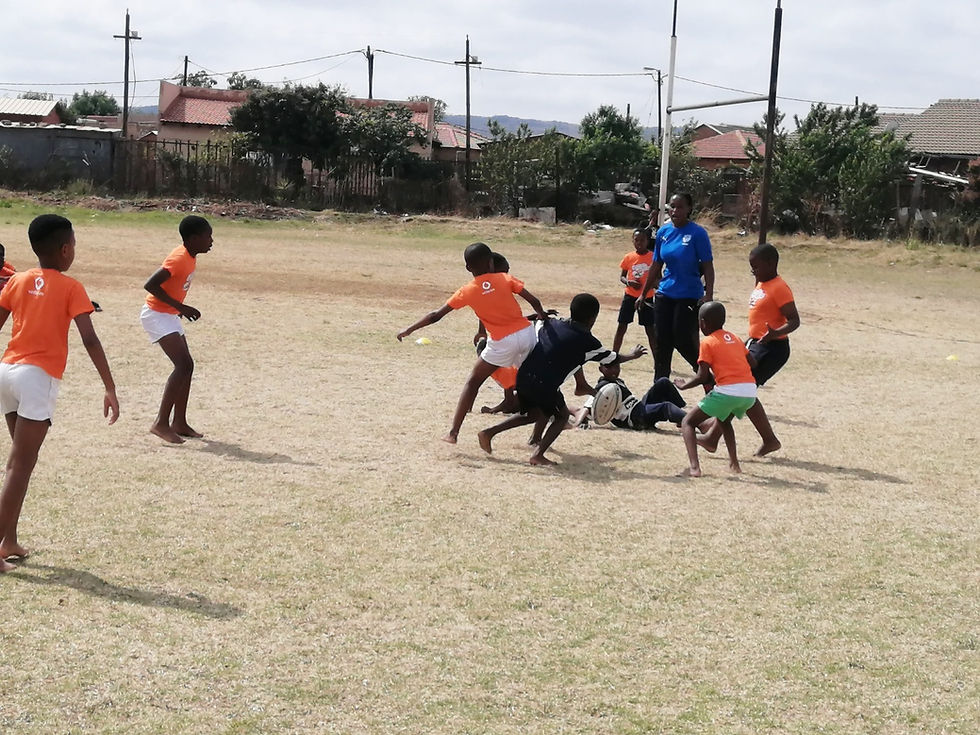From the Township to the Tryline: How Club Rugby is Creating Opportunities in Disadvantaged Communities
- Yolanda Makhubele
- Oct 2, 2025
- 3 min read

Rugby is deeply rooted in South African heritage; we can see it in the sea of green and gold jerseys and the smell of braai meat filling the air on match days, to communities coming together to support and uplift our country’s rising stars at inter-school and club rugby tournaments. This can be seen through our coverage of the sport as well where Springbok matches are broadcast nationally, where club and school tournaments can be watched on platforms like SuperSport or SABC Plus.
Even with national coverage and popularity, rugby tends to be overlooked in certain spaces, namely in townships and women’s rugby due to a lack of access to developmental opportunities. But organisations like the Blue Bulls Rugby Union (BBRU) are actively working towards creating more opportunities for women and in disadvantaged communities. We had the opportunity to interview Jappie Modibane, the cluster manager for the BBRU and hear his insights on Club Rugby in these often-overlooked areas.
Is there an interest in rugby in townships and predominantly black communities?
Due to racist selection processes during apartheid, rugby has always been seen as a symbol of white dominance, with painfully slow progress even after apartheid, but the 2019 Rugby World Cup national team had changed mindsets with Siya Kolisi being the first black Springbok captain and a starting lineup with six black players included, which inspired rugby
players in townships like Tembisa and giving them hope that they can also build a career playing rugby.
Mr Modibane replied: “Rugby is played with great enthusiasm at both primary and high school levels by boys and girls, showing a deep-rooted interest and passion within these communities… Club rugby initiatives promote unity, identity and opportunity through bridging the gap between schools, local communities and professional rugby structures, as well as serving as a developmental pathway for aspiring rugby players.”
What are some challenges that players face and does the BBRU have any initiatives to support promising talent in underprivileged areas?
A few challenges faced by rugby players in these areas vary from limited parental support to inadequate rugby facilities and minimal backing from local businesses. While these challenges are prevalent, players can still join recruitment drives run by local clubs in specific communities, which can open doors to players beyond formal school systems. The BBRU runs a Community Schools League System and Youth Club Systems that identifies and nurtures talent in these areas as well.
Are there enough opportunities for women and youth interested in playing rugby?
“Yes, opportunities are growing and becoming more accessible to both women and youth. We have active Youth and Senior Clubs in townships such as Atteridgeville, Soshanguve, Mamelodi and Eesterus. Our Club league and VUKA High Schools league. are vibrant platforms that give players exposure and competitive experience.” VUKA Is a rugby development project created by the South African Rugby Legends Association in partnership with the South African Rugby Union (SARU) with a focus on uplifting young players in disadvantaged communities who have traditionally been excluded from structured
rugby training and grassroots level competition.
How can Coaches and Clubs create opportunities for players with BBRU and its other associations?
“There are existing channels of engagement through various association affiliations and meetings – including coach, referee and club associations, which promote collaboration and resource sharing to uplift players.” The Blue Bulls
Rugby Coaches Association (BBRCA) offers coach mentorship, education and certification as well as a strong network of coaches with a passion for Rugby.
Does the BBRU have any upcoming community engagement initiatives?
“Yes, we continually plan and execute community programmes aimed at talent identification, development clinics, and local club empowerment, ensuring consistent growth in township rugby.” An example of these community engagement initiatives in action is iQhawe Week, a yearly tournament aimed at empowering under-15 boys and girls from lower league and nontraditional rugby schools and give them an opportunity to play rugby at the highest level and a chance to be scouted into a traditional rugby school.
Closing Remarks
Club rugby gives rugby players an opportunity to make a living playing the sport they love, with top players like Handre Pollard earning over R15 million per season by playing for international clubs, this is a clear indication that you don’t
have to play for the Springboks to earn a salary from rugby. Associations like the BBRCA and VUKA development project open doors for players and coaches to more opportunities for development and empowerment in underprivileged communities which gives more people a chance to earn a living from rugby, allowing more players, coaches and
communities to participate in the sport they are passionate about.



Comments